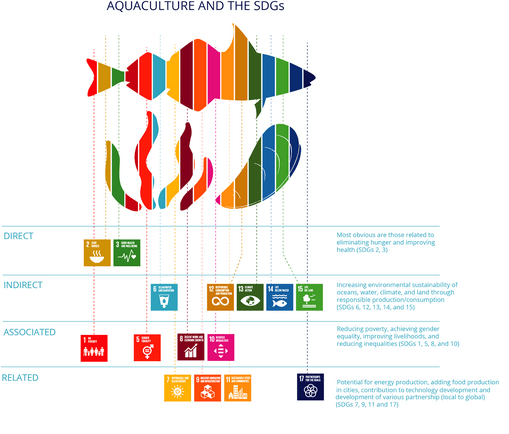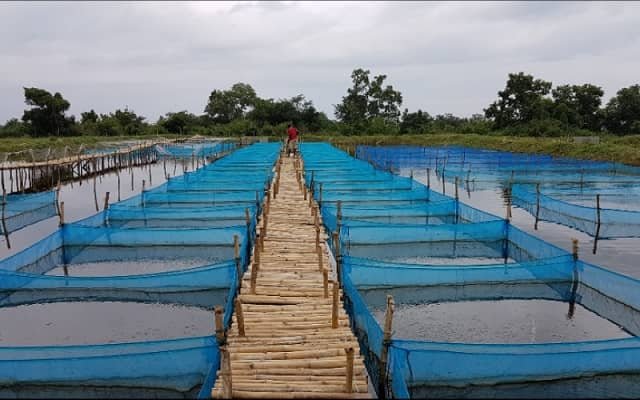
The various sectors of the aquaculture industry make significant contributions to achieving the Sustainable Development Goals (SDGs)/Agenda 2030, and these contributions can be increased in the future.
Aquaculture provides many opportunities to contribute to most of the SDGs. There are many factors that influence the outcomes for sustainable development goals of different types of aquaculture systems in different situations.
For example, low trophic level aquaculture systems, such as bivalves, have relatively low environmental footprints compared to many terrestrial animal production systems and can even provide environmental restoration functions.
Researchers from The Beijer Institute, University of New England, University of Leeds, University of Tasmania, Universidad de Concepción, and other international academic institutions published a scientific review emphasizing the need to improve the integration of aquaculture in global food systems dialogues.
The document includes a review of scientific literature on how the aquaculture industry is linked to specific SDG indicators and presents a selection of case studies to illustrate:
- The diversity of the aquaculture sector and the role this diversity plays in contributing to the SDGs.
- Examples of methodologies for identifying the contribution of aquaculture to the SDGs.
- Trade-offs between the contribution of agricultural systems to achieving the SDGs.
Role of aquaculture in achieving the SDGs
According to the authors of the study, aquaculture can contribute to all 17 SDGs, but its main contributions are related to:
a. Ending hunger and improving health (SDGs 2, 3).
b. Increasing environmental sustainability of oceans, water, climate, and soil through responsible production/consumption (SDGs 6, 12, 13, 14, and 15).
c. Reducing poverty, achieving gender equality, improving livelihoods, and reducing inequalities (SDGs 1, 5, 8, and 10).
Stay Always Informed
Join our communities to instantly receive the most important news, reports, and analysis from the aquaculture industry.
It is not so obvious, but the potential of aquaculture for energy production (e.g., algal biomass), supplying food to cities (e.g., aquaponics), contributing to technological development, and fostering various partnerships (SDGs 7, 9, 11, and 17) is also relevant.
“Considering the current importance of aquaculture, it is surprising to find that aquaculture is almost invisible in the declaration. Only in SDG 14, under indicator 14.7, is aquaculture explicitly mentioned,” the researchers highlight.
Aquaculture diversity and its implications for the SDGs
Aquaculture is highly diverse in terms of intensities, farming types, seed supply, and fattening systems, as well as integration with agriculture or other aquaculture systems.
The diversity of species and systems will have implications for how aquaculture can fulfill the SDGs, especially in the long term.
Promoting greater species diversification and production system diversification will be important for long-term performance in a changing environment. However, focusing on improving only a limited number of species can lead to more rapid improvements in terms of producing species with the best environmental performance from more sustainable systems.
Framework and indicators
According to the researchers, currently, no single framework can capture all spatial-temporal dimensions and scales to evaluate or guide aquaculture’s contribution to “sustainability.”
However, they highlight that there are several frameworks that allow evaluating the contribution of aquaculture to some sustainability dimensions or all dimensions at a specific scale.
The knowledge gained from applying these frameworks to the SDGs is still partial, and there is still a step to relate them to the SDGs. They recommend applying a chosen framework based on circumstances and pragmatism or expanding it with complementary concepts to initiate a dialogue with stakeholders.
Contribution of Aquaculture to the SDGs
The contribution of aquaculture to achieving the SDGs largely depends on species/systems and context, meaning it is related to value chains, product markets, national economy, socio-economic structure/fabric, and governance at different spatial-temporal scales.
Without this understanding, it will be difficult to make predictions about how any specific aquaculture development will unfold and add value to specific policies, such as circular economy, biodiversity conservation, climate emergencies, among others.
“The trade-offs related to the contribution of aquaculture to the SDGs occur at multiple scales and among different types of developments, as well as among different types of aquaculture systems,” the authors of the study highlight.
Conclusions
“Aquaculture has great potential to positively contribute to human and planetary well-being when its products are aligned with the Sustainable Development Goals,” they conclude.
They also emphasize that aquaculture already substantially contributes to many of the SDGs, but the diversity of species/systems, combined with different contexts, may result in incomplete or invisible achievement of the different SDG outcomes.
“Our review concludes that the UN’s SDG framework is a useful and necessary lens to support the sustainable transformation of aquaculture on a global scale in the future,” they concluded.
Contact
Max Troell
The Beijer Institute, Royal Swedish Academy of Sciences
Stockholm, Sweden.
Email: max@beijer.kva.se
Reference (open access):
Troell, M., Costa-Pierce, B., Stead, S., Cottrell, R. S., Brugere, C., Farmery, A. K., Little, D. C., Strand, Å., Pullin, R., Soto, D., Beveridge, M., Salie, K., Dresdner, J., Moraes-Valenti, P., Blanchard, J., James, P., Yossa, R., Allison, E., Devaney, C., & Barg, U. (2023). Perspectives on aquaculture’s contribution to the Sustainable Development Goals for improved human and planetary health. Journal of the World Aquaculture Society, 54( 2), 251– 342. https://doi.org/10.1111/jwas.12946
Editor at the digital magazine AquaHoy. He holds a degree in Aquaculture Biology from the National University of Santa (UNS) and a Master’s degree in Science and Innovation Management from the Polytechnic University of Valencia, with postgraduate diplomas in Business Innovation and Innovation Management. He possesses extensive experience in the aquaculture and fisheries sector, having led the Fisheries Innovation Unit of the National Program for Innovation in Fisheries and Aquaculture (PNIPA). He has served as a senior consultant in technology watch, an innovation project formulator and advisor, and a lecturer at UNS. He is a member of the Peruvian College of Biologists and was recognized by the World Aquaculture Society (WAS) in 2016 for his contribution to aquaculture.







